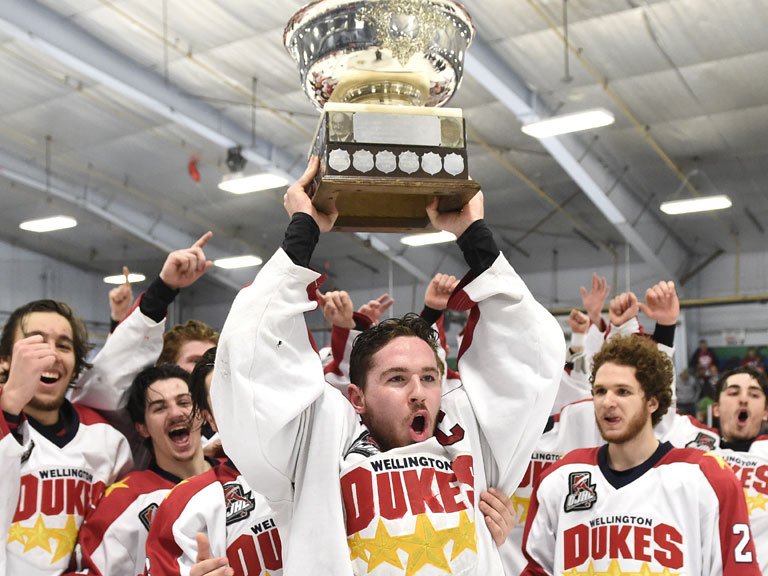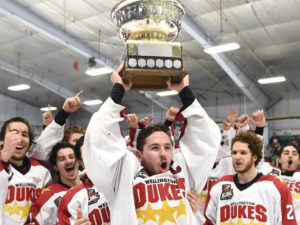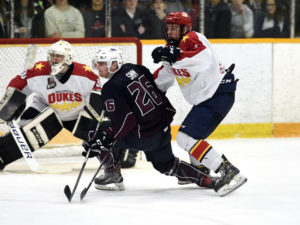Uncategorised
Magnificence

Dukes capture Dudley Hewitt Cup, now prepare for national championship
Nothing came easy to these Dudley Hewitt Cup Champions. It took seven games to dispatch the pesky Pickering Panthers back in March. Another seven games to down the much-improved Newmarket Hurricanes. It took just five games to defeat the Aurora Tigers— yet those were bruising games. And then the Dukes needed six hard-fought games to overcome the Georgetown Raiders and claim the OJHL Championship.
Once in Dryden to compete for the Dudley Hewitt Cup, Wellington lost its first game— virtually assuring they would have to play six games in six days (and win the remaining five) if they were to emerge victorious from this tournament. Which is what they did.
Nor did they make it easy for themselves. The Wellington Dukes amassed huge penalty minutes in the regular season. They earned by far the most penalties in the OJHL playoffs and wildly outpaced Dudley Hewitt Cup competitors with 100 penalty minutes in six games.

Captain Colin Doyle hoists the Dudley Hewitt Cup as Central Canada Champions after leading his team to a 7-4 win over the Dryden Ice Dogs on Saturday. PHOTO: TIM BATES/OJHL IMAGES
What this says is: The Wellington Dukes are surely the best defenders in Central Canada.
Yes, the Dukes’ good fortune has come in no small measure from an unceasing work ethic, one that begins with Captain Colin Doyle and flows through this team like rich oxygenated blood. It is surely the result of astonishingly creative playmaking by skilled young men including Ben Evans, Mitchell Martan, Frank Pucci, Josh Supryka, Declan Carlile and Mason Snell. It is due to raw speed exemplified by Teddy McGeen and Andrew Rinaldi. It is the untiring tenacity of the checkers—Daniel Panetta, Dawson Ellis, Nelson Powers and Graeme McCrory. It is also due to the timely scoring by the snipers: including Bryce Yetman, Jackson Arcan and Mitchell Mendonca. It is also owed in large measure to the inspired and effective coaching staff led by John Druce, Mike Farrugia and Derek Smith.
But no team endures playing so often shorthanded without becoming good at it. And the Dukes have become very good.
It starts in goal. Jonah Capriotti has defined the Dukes’ success in 2018. He is not a six footfour monster—the prototypical OJHL netminder. What Capriotti is, is smart. And athletic. He knows where the puck is at all times—even when he can’t see it. He knows where the puck is going—and who will take the shot. It is this insight that separates him from every other netminder he has faced.
Simply put, the Dukes would not be headed to the RBC Cup were it not for Capriotti. He has not been perfect through the playoffs—he has allowed some tough goals that have cost his team. In game one in Dryden, a simple backhander slipped through his pads. The Dukes lost. It wasn’t the game-winning goal—but rather the game-defining marker.
But that only underlines the pivotal role Capriotti plays in the Dukes’ success. He bounced back quickly and led his team to five straight wins.
A netminder—even an exceptional one like Capriotti—doesn’t put you among the elite defenders in the country on his own. Rather this is the result of hard work and training on the part of every player on the ice.
Mason Snell and Geoff Lawson have been giants anchoring the Dukes zone coverage. Blocking shots and digging hard in the corners on every shift. Declan Carlile and Zach Uens have been stalwarts in their own zone—but also threats to provide offensive punch each time they are on the ice. Warren Mackenzie has come alive in these playoffs and working hard to win every battle for the puck. And Andrew Barbeau has stepped in for the injured Keegan Ferguson by providing steady, strong and smart leadership all over the ice.
 But it goes further still. Speed and intelligence are most often associated with offensive playmaking and scoring. Yet, the Wellington Dukes use these attributes, as much or more, on defence. They have become exceptionally adept at closing down passing lanes, intercepting passes and using their speed to create oddman rushes.
But it goes further still. Speed and intelligence are most often associated with offensive playmaking and scoring. Yet, the Wellington Dukes use these attributes, as much or more, on defence. They have become exceptionally adept at closing down passing lanes, intercepting passes and using their speed to create oddman rushes.
Defender Zach Uens uses his feet and skill to stay attached to the stealthy Dryden forward as netminder Jonah Capriotti assess the rush headed his way. PHOTO: TIM BATES/OJHL IMAGESTo do this, everyone on the ice must be working together—anticipating what the other will do and respond as a unit. Winning the battle efficiently, supporting each other, and moving the puck forward at speed.
The Dukes were the elite team at the Dudley Hewitt tournament. Only by hobbling themselves did they make it a contest—one that might have gone the wrong way. (The Dukes allowed six power play goals in the six game tournament— four more than the next team. Though they did score two short-handed goals.)
It is hard to imagine this fortune extending to Chilliwack— but who knows.
SUPPORTING THEIR DUKES
The Highline Hall served as host during the Dudley Hewitt Cup—projecting the games live on two large screens. Hundreds of Dukes fans enjoyed the fraternity and the achievement vicariously for each game—cheering and clanging tin cans with every goal, loud complaints for some questionable refereeing.
SEND-OFF
The Dukes will be having a barbecue for the fans and players Wednesday evening at 5 p.m. Come out and give the Dukes a memorable send off to Chilliwack, B.C.

Comments (0)